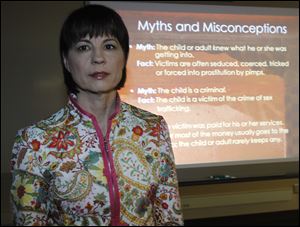
'John School' offers new perspective
1st-time male offenders hear of prostitution's effects on women
4/4/2011
Maggie Billings, the diversion program coordinator for the Lucas County Human Trafficking Coalition, says she could see the surprise on the men's faces during the first local ‘John School.'
Maggie Billings remembers the reactions she got from a group of men in the summer of 2010 after she completed a segment on human trafficking in the first-ever local "John School."
"I turned around and they were pale and they looked stunned," she said. "It just made a difference. They hadn't been thinking about all those things."
Prostitution Offender Program of Lucas County, or John School, is for men charged with soliciting prostitutes.
The daylong diversion program is available only to first-time offenders who qualify.
Those who complete the program can have the record of their offense sealed.
"It's basically to educate [the men]," said Ms. Billings, the diversion program coordinator for the Lucas County Human Trafficking Coalition, which organized the program. "… These guys think it's a victimless crime. They don't realize what they're doing and that they are fortunate that it was a police officer … they encountered because they could have been caught up in serious charges had it been a minor."
Solicitation arrests made the local news recently after the Toledo police vice unit initiated a reverse sting through an Internet advertisement.
Eight men were arrested, including a Northwood High School physical education teacher, who later resigned from his job.
Ms. Billings said some men don't understand the consequences of their actions — not only on the women they solicit, but also on society.
Three men participated in the program when it was introduced last summer.
At least two from the recent sting will participate, according to court records.
Celia Williamson is a University of Toledo social work professor who has been researching Lucas County's prostitution and human-trafficking problem.
She noted how the focus was on Ohio — particularly Toledo — in 2005 when a federal sting in Harrisburg, Pa., broke up a sex-trafficking operation involving 177 girls and women.
Seventy-seven of the victims, including a 10-year-old, were from the Toledo area.
John School, she said, is a way to address the demand side of the issue.
"We have a few other programs already for supply and distribution, but when it came to demand, we had nothing to offer," Ms. Williamson said. "This is the beginning. This is not where we want to end."
Ms. Williamson called John School the "gold standard" for effectiveness for first-time offenders. But she noted that a program for repeat offenders and even a similar program for those women who are arrested for prostitution still are needed.
John School was modeled after similar programs in other Ohio cities — including Columbus, Cincinnati, and Dayton — and other states where statistics have shown that 70 to 94 percent of the men who participate do not repeat their behavior, she added.
"If they follow through, [the offense] won't appear on their record," she said. "If they continue this type of behavior, they won't have the opportunity again."
As part of the daylong program, men hear from community officials about the legal, health, and moral risks involved in seeking out prostitutes. Ms. Billings said she tries to arrange for a "survivor," or a woman who has been able to break free from prostitution, to speak to the men about her former life.
During her term in the state Senate, Teresa Fedor (D., Toledo) sponsored the human-trafficking bill that went into effect March 23 — the same day police initiated the reverse sting.
The law created a stand-alone, second-degree felony of "trafficking in persons" that carries a potential prison sentence of eight years.
For the first time, Ohio defined human trafficking as the act or attempt to "recruit, lure, entice, isolate, harbor, transport, provide, obtain, or maintain" another person, knowing that the victim will be forced into labor, prostitution, or pornography.
Ms. Fedor, now a state representative, said that many don't realize that women involved in prostitution often have been forced into it by pimps, and in many cases, these women are minors.
Some men may not be swayed, she said, but others may benefit from learning about the larger world of prostitution.
"It really helps educate the customer on the impact of their actions," Ms. Fedor said. "There's a very high price to society other than just being wrong and illegal. There's a high cost to the victim too."
The program costs participants $300. It is meant to be self-supporting, with some money set aside for nonprofit groups that assist women caught up in prostitution, Ms. Billings said.
Toledo Municipal Court judges offer the program as an alternative to a criminal record in some cases.
"Like some of our other diversion programs, this is a great way for some of the first-time offenders to really learn the consequences of their actions and to give them an opportunity to examine what may have led to that behavior," said Toledo Municipal Court Presiding Judge Michael Goulding.
Toledo Police Chief Mike Navarre said reverse stings help deter solicitation.
"We do this, we've done it for a while, and will continue to do it," the chief said.
Contact Erica Blake at: eblake@theblade.com or 419-213-2134.